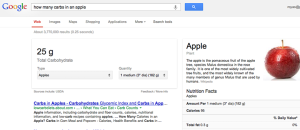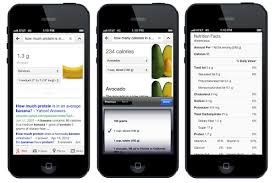 Your new-nutritionist is now Google, which launched a nutrition utility through Google Search.
Your new-nutritionist is now Google, which launched a nutrition utility through Google Search.
“From the basics of potatoes and carrots to more complex dishes like burritos and chow mein, you can simply ask, ‘How much protein is in a banana?’ or ‘How many calories are in an avocado?’ and get your answer right away,” the official Google Search blog explains.
Over 1,000 items – fruits, vegetables, meats, dairy items, and prepared meals like Chinese and Mexican take out, as mentioned in Google’s quote above – are searchable via web and mobile, powered by Google’s Knowledge Graph. The Knowledge Graph is the secret in Google’s search sauce that enables you to ask Google anything, and Google then connects the dots underneath your question to give you the answer you were looking for — and more, Google promises.
In the case of your food query, your nutrition search can yield you calories, protein, carbs, sodium content — the specific nutrition component you’re seeking — and even more focused responses whether you are looking into yellow squash, zucchini, or spaghetti squash underneath a search for simply “squash.”
 Health Populi’s Hot Points: Tracking food and calories is the most popular mobile app use in health. But some people don’t yet use mobile health apps. So while some might question Google’s Don’t Be Evil motto (see #6 on this list), this nutrition capability is a good thing for people who regularly look to Google search and want to make healthy decisions every day. This is especially useful via mobile phone, pictured here, as we move throughout the day away from the home kitchen.
Health Populi’s Hot Points: Tracking food and calories is the most popular mobile app use in health. But some people don’t yet use mobile health apps. So while some might question Google’s Don’t Be Evil motto (see #6 on this list), this nutrition capability is a good thing for people who regularly look to Google search and want to make healthy decisions every day. This is especially useful via mobile phone, pictured here, as we move throughout the day away from the home kitchen.
However, there are other well-used, proven and outstanding food/nutrition apps that many of us have been relying on and benefiting from for some time. Among my favorites are:
– LoseIt!
– MyFitnessPal Calorie Counter
– Mint Nutrition, and
The new Zipongo app looks promising, as well.
The point is, tracking food and calories does make a difference in mindful eating and food/nutrition choices. If you want to lose weight, journaling food is a success factor in taking off pounds and supporting behavior change that’s tough. If you want to stay where you are weight-wise, tracking calories makes you mindful throughout the day.




 Thank you FeedSpot for
Thank you FeedSpot for